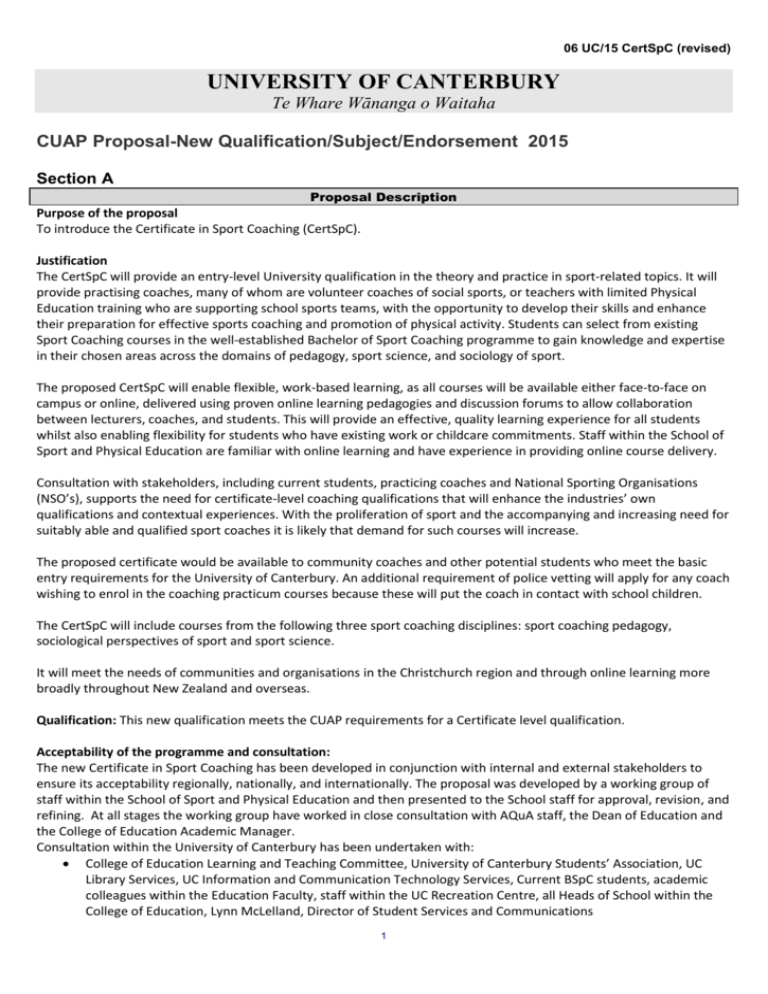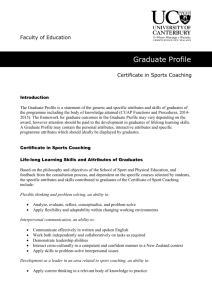Certificate in Sports Coaching
advertisement

06 UC/15 CertSpC (revised) UNIVERSITY OF CANTERBURY Te Whare Wānanga o Waitaha CUAP Proposal-New Qualification/Subject/Endorsement 2015 Section A Proposal Description Purpose of the proposal To introduce the Certificate in Sport Coaching (CertSpC). Justification The CertSpC will provide an entry-level University qualification in the theory and practice in sport-related topics. It will provide practising coaches, many of whom are volunteer coaches of social sports, or teachers with limited Physical Education training who are supporting school sports teams, with the opportunity to develop their skills and enhance their preparation for effective sports coaching and promotion of physical activity. Students can select from existing Sport Coaching courses in the well-established Bachelor of Sport Coaching programme to gain knowledge and expertise in their chosen areas across the domains of pedagogy, sport science, and sociology of sport. The proposed CertSpC will enable flexible, work-based learning, as all courses will be available either face-to-face on campus or online, delivered using proven online learning pedagogies and discussion forums to allow collaboration between lecturers, coaches, and students. This will provide an effective, quality learning experience for all students whilst also enabling flexibility for students who have existing work or childcare commitments. Staff within the School of Sport and Physical Education are familiar with online learning and have experience in providing online course delivery. Consultation with stakeholders, including current students, practicing coaches and National Sporting Organisations (NSO’s), supports the need for certificate-level coaching qualifications that will enhance the industries’ own qualifications and contextual experiences. With the proliferation of sport and the accompanying and increasing need for suitably able and qualified sport coaches it is likely that demand for such courses will increase. The proposed certificate would be available to community coaches and other potential students who meet the basic entry requirements for the University of Canterbury. An additional requirement of police vetting will apply for any coach wishing to enrol in the coaching practicum courses because these will put the coach in contact with school children. The CertSpC will include courses from the following three sport coaching disciplines: sport coaching pedagogy, sociological perspectives of sport and sport science. It will meet the needs of communities and organisations in the Christchurch region and through online learning more broadly throughout New Zealand and overseas. Qualification: This new qualification meets the CUAP requirements for a Certificate level qualification. Acceptability of the programme and consultation: The new Certificate in Sport Coaching has been developed in conjunction with internal and external stakeholders to ensure its acceptability regionally, nationally, and internationally. The proposal was developed by a working group of staff within the School of Sport and Physical Education and then presented to the School staff for approval, revision, and refining. At all stages the working group have worked in close consultation with AQuA staff, the Dean of Education and the College of Education Academic Manager. Consultation within the University of Canterbury has been undertaken with: College of Education Learning and Teaching Committee, University of Canterbury Students’ Association, UC Library Services, UC Information and Communication Technology Services, Current BSpC students, academic colleagues within the Education Faculty, staff within the UC Recreation Centre, all Heads of School within the College of Education, Lynn McLelland, Director of Student Services and Communications 1 06 UC/15 CertSpC (revised) External consultation has been undertaken with community sports organisations such as Sport Canterbury, Canterbury Netball, Canterbury Hockey, Christchurch Metropolitan Cricket and potential students. The consultation has provided valuable input in the development of this proposal. Treaty of Waitangi: This proposal is consistent with the University’s commitment to the principles of the Treaty of Waitangi. Consultation has been undertaken with the College’s Māori and Bicultural Committee, as well as Liz Brown, Kaiārahi Māori for the College of Education, Health and Human Development, and the AVC (Māori), Darren Russell, who have all supported this proposal. The Certificate supports the Rautaki Whakawhanake Kaupapa Māori – Strategy for Māori Development. In particular, the Certificate is expected to assist in recruiting Māori students to the university and may provide an entry point for those who may not otherwise consider university study. The Certificate will also ensure that students begin to develop their bicultural competence and confidence in alignment with the UC Graduate Attributes as one of the core courses, SPCO101, Introduction to Sport Coaching includes specific bicultural content and learning outcomes related to Te Reo and tikanga Goals of the programme: The proposed Certificate in Sport Coaching will enable students to graduate with knowledge of selected topics in Sport Coaching to enable them to provide effective support for school and community-level sports teams and individual athletes. Consultation with the sport industry suggests that the courses developed will provide a framework for community coach education. Another major goal of the programme is to identify and support quality coaches who are capable of transferring to, and completing, Bachelor-level study in sport coaching. Finally, the new award will enable students who for a variety of reasons (e.g., changes in personal circumstances or career aspirations, unsatisfactory academic progress etc.), decide not to, or are unable to, complete a full Bachelor of Sport Coaching degree to transfer courses completed toward the degree to the proposed new award, and thus have their achievements, nevertheless, acknowledged via the award of the Certificate. Outcome statement The Certificate in Sport Coaching (CertSpC) provides a programme through which coaches can complement and enhance their work-based skills or, if they are currently not employed in the sporting industry, develop skills and competencies to support their knowledge and performance in the area of sport coaching and related fields. The CertSpC will enable graduates to develop knowledge in sociological and pedagogical considerations in sport and will also allow them to gain skills in specialist areas such as strength and conditioning, performance analysis, nutrition, sport psychology, sport sociology, and athlete-centred sport coaching. Students enrolling in the sport coaching practicums will be able to apply their learning and knowledge in sport coaching settings in areas of their own sporting interest. Graduates will be equipped for further study in sport coaching and sport and exercise science, and for employment in the field of community sport. In a sporting context, graduates will be able to access higher levels within organisations, demonstrating successful development of key sport-related skills. University graduate characteristics and Qualification graduate profile Based on the philosophy and objectives of the School of Sport and Physical Education, and feedback from the consultation process, and dependent on the specific courses selected by students, the specific attributes and skills contributed to graduates of the Certificate of Sport Coaching include: Flexible thinking and problem solving, an ability to: Analyse, evaluate, reflect, conceptualise, and problem-solve Apply flexibility and adaptability within changing working environments Interpersonal communication, an ability to: Communicate effectively in written and spoken English Work both independently and collaboratively on tasks as required Demonstrate leadership abilities Interact cross-culturally in a competent and confident manner in a New Zealand context Apply skills to problem-solve interpersonal issues Development as a leader in an area related to sport coaching, an ability to: 2 06 UC/15 CertSpC (revised) Apply current thinking in a relevant body of knowledge to practice Analyse and evaluate own performance and take responsibility for ensuring quality outcomes Provide an inclusive and supportive environment for sporting participants in a range of settings Develop a commitment to lifelong learning and development Work within and apply administrative policies and procedures in a range of community and/or school sporting settings Work effectively within a multi-cultural environment Alignment with the UC graduate profile Produce students who are biculturally competent and confident: One of the core courses, SPCO101 contains explicit bicultural content towards enhancing bicultural competence of our students. In addition, students may opt into the further course, SPCO208, Critical and Bicultural Perspectives in Sport Coaching, to further enhance their bicultural capabilities and understandings. Produce students who are engaged with the community: One of the core courses, SPCO101 includes supervised micro coaching sessions with local schools which provides contact and experience with the wider community. Other optional courses include interaction with community organisations such as Sport Canterbury, Sports in the Park, organisations running Special Olympics programmes. Most courses in the Bachelor of Sport Coaching schedule have a strong focus on community sport provision and coaching. Produce students who are globally aware: Courses in the Bachelor of Sport Coaching schedule address international issues, from multicultural understandings to practises in different nations, and examples of sporting practice which are internationally observed. Produce students who are innovative and work-ready: A particular strength of the Bachelor of Sport coaching programme, from which CertSpC students will select courses, is the development in students of transferrable skills which are immediately valuable in the professional workplace. This is in the form of presentations for course assessments, developing team-working and communications skills (this is one form of assessment featured in SPCO101, Introduction to Sport Coaching, as well as in other courses). In optional practicums, students work within schools or sporting organisations to gain an understanding of professional practice honing communication and leadership skills, and other courses deal with interpersonal communications, planning, and group management. Programme overview The Certificate in Sport Coaching (CertSpC) comprises four 15-point courses totalling 60 points, where at least 45 points are taken from 100-level and 200-level courses from the Bachelor of Sport Coaching schedule, and up to 15 points may be taken from other approved courses from schedules of other degree programmes in the University of Canterbury. SPCO101 Introduction to Sport Coaching and SPCO201: Athlete-Centred Coaching are compulsory courses for this programme, and SPCO101 includes a significant bicultural component which contributes towards meeting the aims of the graduate profile of UC. All courses will be offered face-to-face and through flexible, online delivery. Proposed teaching/delivery methods The proposed Certificate in Sport Coaching will enable both face-to-face and flexible, work-based learning through online delivery. Campus-based courses will integrate students in the Certificate in Sport Coaching with Bachelor of Sport Coaching students and student taking other degree programmes who are enrolled in Sport Coaching courses. Distance delivery will use proven online learning pedagogies and discussion forums to allow collaboration between lecturers, coaches, and students. This will provide an effective, quality, online learning experience while also enabling flexibility with students who have significant work and family commitments. Staff within the School of Sport and Physical Education are experienced in facilitating both face-to-face and online learning, and have experience in providing successful delivery in both modes. Prescriptions for courses Students enrolled in the proposed Certificate in Sport Coaching will enrol in existing 100-level and 200-level courses from the Bachelor of Sport Coaching schedule (Calendar pages 818-821). Assessment and moderation procedures 3 06 UC/15 CertSpC (revised) Assessment procedures will include a combination of: Individual tests and exams, projects, online presentations, literature reviews, practicum portfolios and digital media and video analysis Moderation includes internal moderation of all examinations, review of results in examiners’ meetings each semester, graduating year reviews, and other review procedures carried out as part of the Bachelor of Sport Coaching programme reviews. Resources As this programme will be delivered entirely through existing courses, but is likely to attract significant additional online enrolments, the programme will require the following resources: Lecture staff and associated workload hours associated with administration/marking (combination of current Faculty and external professional contractors) IT equipment (software to support course content). Consultation is currently underway with University of Canterbury Electronic Learning Media support staff to ensure sufficient resources are available to support additional students enrolling for online occurrences of courses Library services and content -in consultation with the university library management, the current resources for the Bachelor of Sport Coaching programme are being confirmed, access to electronic resources (ebooks) are being extended and any additional library resource needs will be addressed. Plans for monitoring programme quality A programme monitoring committee will be formed and will comprise three staff from the School of Sport and Physical education and will also seek to include the Student Experience Manager and the Academic Manager from the College of Education. The programme monitoring committee will review the content of the programme on a regular basis. Pre and post course meetings will be held with all teaching staff and chaired by the Head of School. Student evaluations will be mandatory for all courses with CertSpC enrolments and will be administered through the Centre for Evaluation and Monitoring at the University of Canterbury. Review of the programme The programme monitoring committee will review the content of the programme on a regular basis. Pre and post course meetings will be held with all teaching staff and chaired by the Head of School. Statement re Section B Section B has been prepared and will be made available to CUAP on request. It is included at the end of this document. For New Qualifications – TEC/NZQA/UNZ Requirements EFTS value of qualification: 0.5 EFTS NZSCED code: 092103 NZQA exit level of qualification to go on the New Zealand Qualifications Framework: Level 5 Statement regarding funding: N/A Memorandum of understanding: N/A Duration of the Qualification-NZQF requirement Minimum number of points to complete the qualification: 60 points Vacation/recess weeks: As per scheduled University vacation/recess weeks Work experience/placement hours per week: SPCO110 Coaching Practicum 1: minimum 2 hours per week; SPCO210 Coaching Practicum 2: 2 hours per week; NB: not all students will complete these courses Tuition/teaching (full-time equivalent) weeks (including exam and study weeks): 18 weeks (1 semester full-time or part-time equivalent) Teaching hours per week: 3 taught hours per week per 15-point course (excepting SPCO110 and SPCO210) Self-directed learning hours per week: 9 hours self-directed learning hours per week per 15-point course (excepting SPCO110 and SPCO210) 4 06 UC/15 CertSpC (revised) Calendar Form New Qualification Regulations UC Calendar 2014 Page 142, underneath the regulations for the CertLS, insert Certificate in Sport Coaching (CertSpC) These award regulations should be read in conjunction with General Course and Examination Regulations 1) Entry Requirements a) Candidates must satisfy the admission requirements of the University. b) The programme of study for each candidate must be approved by the Dean of Education. 2) Structure of the Programme a) Candidates shall complete a flexible course of study made up of 60 points (0.5 EFTS) from the Bachelor of Sport Coaching schedule as follows: i) SPCO101: Introduction to Sport Coaching, SPCO201: Athlete-Centred Coaching; and ii) a further 45 30 points (0.250 EFTS) from schedule C of the degree of Bachelor of Sport Coaching b) With prior approval, other undergraduate courses up to the equivalent of 15 points may be credited from another school, department, College or from another university or tertiary institute, provided that: i) these are completed within the prescribed time limits for the certificate ii) have not been credited to another completed qualification Note: Candidates for SPCO110 or SPCO210 are required to be vetted by police prior to enrolling in these courses. 3) Time limits a) A full-time candidate must complete the qualification in no more than one year of enrolling in the first course. b) A part-time candidate must complete the qualification in no more than four years of enrolling in the first course. c) The Dean may extend these time limits in special circumstances. 4) Transfer of Earlier Credit a) Courses passed from the Bachelor of Sport Coaching Schedule may be transferred to the Certificate provided that the: i) courses have not been credited to another completed qualification ii) courses were passed within the five years prior to starting the first course in the Certificate iii) course of study will satisfy the requirements detailed under Regulation 2. Structure of the Programme. b) Any courses that are transferred this way will not be available for credit to the Bachelor of Sport Coaching at a later date. 5) Transfer of Credit to the Bachelor of Sport Coaching or Other Qualifications a) A candidate with a completed CertSpC may be exempt 60 point (0.5 EFTS) from the Bachelor of Sport Coaching Degree b) Candidates under 5 a) must meet the entry criteria for the Bachelor of Sport Coaching Degree c) Transfer of credits from an incomplete CertSpC to another award of the University will be subject to the Regulations of that award. d) Transfer of credits from a completed CertSpC to another award of the University will be subject to the determination of the appropriate Dean. Note that the Certificate in Sport Coaching is considered completed when the student graduates with the certificate 5





